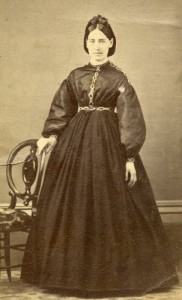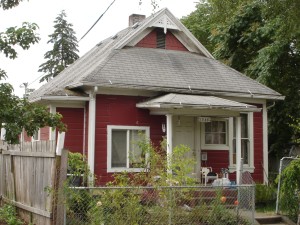About a Mariage Part II
I’ve had a hard time getting around to posting Part II of William and Rosa’s story. It turns out that putting myself in their place and trying to tell their story without veering in to fiction is harder than I thought it would be. Nonetheless here is Part II. This is the story of William and Rosa Martin’s years together. You can read Part I here.
Following financial reversals in Michigan William Martin moved his family to Dayton, Oregon. I have no idea why he chose Dayton, but he did, and moved the family to a small house there. Soon William bought a 15 acre plot of land east of Dayton on the Yamhill River.

What did Rosa think about living in this isolated place? All we have to go on is Amy’s memoir.
She describes the land as “back of another farm, but my father had purchased a right of way out by way of a gulley. The struggle to make a living in those days of not much market was hard and we never had money for building that road out so followed a path along the riverbank along the edge of the other farm to get out. Some of the families on that farm were nice about it, but one was downright mean.
We always had something to eat but no dietician of this state would have approved of it at times. If our cow went dry we had to go without butter. We raised some meat and salted it away. There was very little money and we had no fruit jars, or not enough to can many vegetables or fruits, so my mother dried as many berries and other kinds of fruit as possible. Often we had no sugar and tried to eat the stewed fruit without it.
Clothes were a problem. My brother and I went barefoot every summer and sometimes had to go to school that way. It hurt our pride more than our health.””
Rosa was sufficiently discouraged with life on the farm that she moved to Portland hoping to earn money by taking in borders. When this didn’t work she moved back to the property near Dayton. All of Rosa’s daughters received teaching certificates and began teaching by the age of twenty. This helped the family finances, but they still lost the 15 acre homestead.
By 1900 Rosa was living with her children in Dayton, William was not with them and was presumably somewhere in Oregon. In 1900 Rosa came into some money left to her by her father, Francis Blood. The story of what became of this money is a bit odd. Again, I quote Amy, “Then it was that Grandfather Blood passed away and Mother came into some money. In the meantime, J. and Rosa had kept up the interest on the loan we had from a woman teacher who was money mad. So, having heard that some money was coming to mother, she appeared with a shyster lawyer even before we had not yet received anything from my grandfather’s estate. She signed a document and my sister Rosa witnessed it. This was sent back to Michigan and the lawyer there discovered it had been tampered with so wrote to mother about it. This rascal had raised the amount, but Michigan being so far away it was going to cost us more to fight it than to pay it. The “teacher” would do nothing about it ether.”
So Rosa and her children continued to support themselves by teaching and struggled along with very little money.
William Martin died in Yamhill County, Oregon in 1904. He had $50 and owned 160 acres of land in an isolated spot. I don’t know how he came into possession of that land. I do have his probate papers. William died intestate. His daughter, Jessie, claimed $500 for “money advanced for incidental expenses and support of family.” Jessie then purchased the acreage for $550. I assume that no money changed hands and that she received the land to settle the debt she claimed.
By 1905 Rosa and her children had moved to Salem Oregon where Rosa and her daughters taught.
By the time the 1910census was taken Rosa was retired and was living with and supported by her daughters, Amy and Jessie. Her daughter Rosa and her son Francis had married and were starting their own families.

Rosa died in 1920. Her two daughters continued to live in the house on Lee Street until they were no longer able to care for themselves.
Perhaps if there had been more opportunities for women to work and support themselves Rosa and William’s story would have been different. We say that money can’t buy happiness and that may be true, but lack of money certainly brought this family buckets of sadness. Not all stories have happy endings.

Leave a Reply